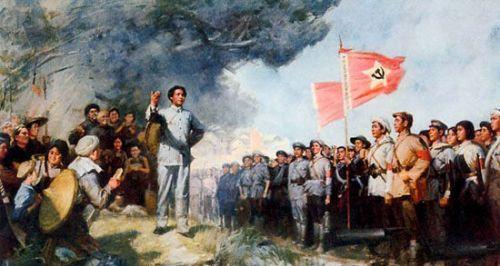
On September 29, 1927, Mao Zedong led the remnants of the Autumn Harvest Uprising to Sanwan Village in Yongxin County, Jiangxi. After many battles, the troops have less than a thousand people. There are few officers and soldiers, few guns, people's hearts are floating, and pessimism is spreading. The rebel forces are in danger of falling apart.
That evening, Mao Zedong presided over an enlarged meeting of the Former Enemy Committee at the Taihexiang grocery store, summed up the lessons learned from the Autumn Harvest Uprising, analyzed the political and ideological situation of the troops, and decided to reorganize the troops.
Early the next morning, Mao Zedong announced to the troops the decision on reorganization at Maple Tree Ping in Sanwan: First, party organizations at all levels should be established in the troops, with small groups in squads and platoons, "branches built on companies," and battalions and regiments had party committees; second, the troops were reorganized and reorganized, and the original division was downsized into a regiment; third, a soldiers' committee was set up to implement a democratic system within the army.
Mao Zedong said firmly: "Comrades, now the enemy is just putting cold guns behind us. Everyone was born to a woman, and they all had two arms and two legs. Comrade He Long started with two kitchen knives and is now a military commander. We are all rioting, one man can block the enemy ten, ten can block him a hundred. We still have a team of nearly a thousand people, are we still afraid that we will not be able to do it? Without setbacks and failures, there would be no successes and victories! ”
Mao Zedong's words, like a shining spark, ignited the flame that was about to be extinguished.
The old site of the "Three Bays Adaptation"
Mao Zedong promulgated the principle of "those who wish to stay, and those who are willing to leave will leave," and said to the officers and men: "I Mao Zedong did not want to promote officials, second, did not want to get rich, and third, did not want to support his family, and only wanted to liberate the toiling masses of the world." This trip is long, the mountains are long, the task is long, it may be very bitter, it is dangerous, but it is also very glorious. People have their own aspirations, there are those who are willing to follow me, please stand on the left, I warmly welcome; there are those who are willing to go home, please stand on the right, I warmly bid farewell, and send the road fare! ”
No sooner had Mao Zedong finished speaking than Wan Xixian was the first to stand next to Member Mao, take the lead in raising his right arm, and shout slogans such as "Resolutely follow Member Mao in the revolution." At the instigation of Wan Xixian, a large number of Communists, Communist Youth League members, and revolutionary fighters from workers' and peasant backgrounds rushed to the left of the maple tree, raised their weapons in their hands, and the slogan of "following Commissar Mao to fight the world and resolutely revolutionizing to the end" arose one after another.
There was a warrior named Chen Sankui, who was worried about his sick old mother at home, and hesitated on the issue of "going" and "staying", and was in a dilemma. When Mao Zedong learned of the situation, he immediately handed over to him the 40 silver millimeters and 5 silver dollars he had saved, and advised him to go home and cure his wife's illness, and to make a revolution with the poor villagers in his hometown. Chen Sankui left the army with tears in his eyes. The next day, Chen Sankui returned again, and he returned with more than a dozen young and middle-aged watches. When he saw Mao Zedong, he said excitedly: "I will always do the revolution with you." ”
To this day, there is still such a song in Sanwan Village: "When you are a soldier, you will come to be a Red Army, and everywhere workers and peasants will welcome you." ”